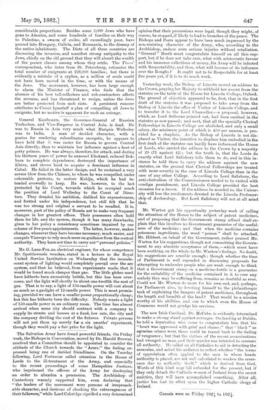General Kaufmann, the Governor-General of Russian 'Turkestan, and Vice-Emperor in
Central Asia, is dead. He was to Russia in Asia very mach what Marquis Wellesley was to India. A man of decided character, with a genius for rendering subordinates energetic, he appears to have held that it was easier for Russia to govern Central Asia directly, than to niaintain her influence against a host of petty princes. He was always, therefore, for attack, and during his thirteen years 'of power he annexed Khokand, reduced Bok- hara to complete dependence, destroyed the importance of Khiva, and strove hard to acquire a dominant influence in Cabul. He failed in the latter design, and he sustained a very severe blow from the Chinese, to whom he was compelled. under -colourable pretexts, to restore Kuldja, which be had in- tended avowedly to keep. He was, however, to the last protected by his Court, towards which he occupied much the position of Lord Wellesley to the Court of Direc- tors. They dreaded his ambition, disliked his expensiveness, and fretted under his independence, but still felt that he was too strong and original a servant to be recalled. It is, moreover, part of the policy of Russia not to make very frequent changes in her greatest offices. Their possessors often hold them for life, and the system, though it has many drawbacks, gives to her policy a consistency sometimes impaired by our scheme of five-years appointments. The latter, however, makes changes, whenever they have become necessary, much easier, and -compels Viceroys to rely much more on guidance from the central authority. They have not time to carry out " personal policies."
































 Previous page
Previous page